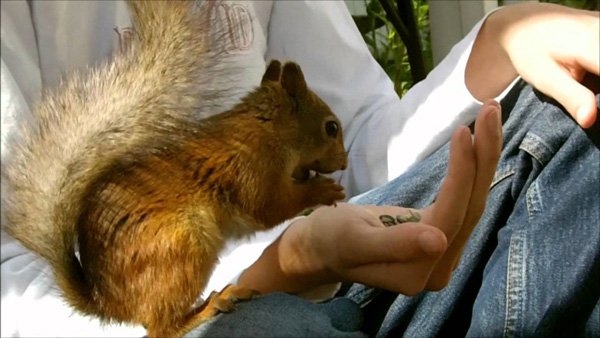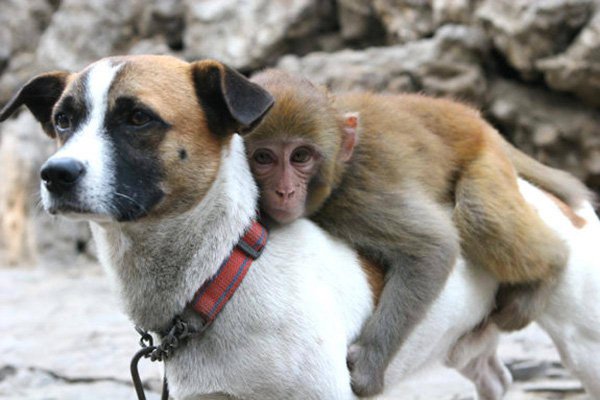
Roundworms (also know as ascarids) are common parasites that live in the intestines of dogs and cats. They can grow up to 3-5 inches long. Symptoms of roundworm in dogs include a pot bellied appearance, weight loss, loss of appetite, coughing, vomiting and diarrhea. Severe infestation can cause death due to mass of roundworms blocking the bowel.
Raccoon roundworms are known as the B. procyonis nematode and they actually do very little harm to a raccoon, but if dogs or humans come into contact with the infested larva, it invades several body organs, the central nervous system, as well as the eyes.
The good thing about roundworms is that it's fairly easy, if not a bit time consuming, to get rid of them. You can find dewormer medicine in both pill and liquid form that you can give to your dog. It will usually take more than one treatment to rid your dog of the worms and the directions usually have you retreating again after around 10 days to two weeks. Take note that these wormers usually will not kill eggs or larvae, but will, instead, cripple the roundworm causing it to pass safely and quickly through your dog.
When they're in big numbers, roundworms can become fatal to a puppy. If the dog is mature, the problems are not as difficult in most cases. If there are too many worms, the mature dog can still experience weight loss, lethargy or a pot belly. In other cases, a dog can vomit or experience diarrhea.
Dogs tend to get infected with roundworms a lot. It is common knowledge that dogs always lick their coats and eat almost anything they see on the ground, so this is how they commonly ingest roundworm eggs. Once ingested and the eggs hatch in the intestine, it travels to other parts of the dog's body via blood flow. Symptoms of roundworm infection include vomiting and diarrhea. Sometimes the dog even vomits up the roundworms! The dog also exhibits a pot-bellied appearance and a dull coat and has weakness, lethargy and abdominal pain.
The Roundworm breeds by laying eggs which are passed out of the dog via its stool. These eggs can live in the soil for long periods of time and once the soil is swallowed the whole cycle starts over again. The first signs of a puppy having Roundworm is that it tends to develop a round, bulging belly and as the worm becomes bigger inside the pup so does the pot belly effect.
Commonly, boils may appear surrounding or inside this wound. Filled with fluids, it may cause the dog a ton of trouble, and is a sign of a exacerbating illness. If these boils worsen, it's essential to get the dog into a vet immediately. Appropriate drugs may have to be given, and perhaps a head cone to keep the dog from gnawing or itching the lesion. If they happen to manage to bite or scrape, they may fill it may bacterias from the mouth and claws, which may cause the Roundworm to spread.
If they grow in numbers inside, these roundworms can prove dangerous to puppies. The problems aren't as bad when the dog has reached maturity already. Still, even with a mature dog, problems like pot belly, lethargy or weight loss can still be experienced. Other potential problems for these dogs can be diarrhea or vomiting.
 Hyperadrenocorticism Or Cushing’s Syndrome In Cats
Hyperadrenocortic
Hyperadrenocorticism Or Cushing’s Syndrome In Cats
Hyperadrenocortic
 The Often Forgotten Health Problems Obesity Causes In Cats And Dogs
The Often Forgott
The Often Forgotten Health Problems Obesity Causes In Cats And Dogs
The Often Forgott
 A Glance At The Benefits Of Raw Pet Food
A Glance At The Benefits Of Raw Pet Food
Raw P
A Glance At The Benefits Of Raw Pet Food
A Glance At The Benefits Of Raw Pet Food
Raw P
 Horse Ulcers: Symptoms, Causes and Remedies
Horse Ulcers: Symptoms, Causes and Remedies
A
Horse Ulcers: Symptoms, Causes and Remedies
Horse Ulcers: Symptoms, Causes and Remedies
A
 That's how long dogs have been our best friends!
That's how long dogs have been our best friends!
That's how long dogs have been our best friends!
That's how long dogs have been our best friends!
Copyright © 2005-2016 Pet Information All Rights Reserved
Contact us: www162date@outlook.com